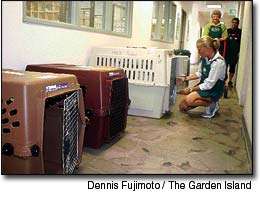The Kauai Humane Society held a mock disaster training exercise over the weekend for volunteers and staff to prepare for sheltering animals in case a hurricane or other disaster should strike the island. For the first time in Hawaii, people
The Kauai Humane Society held a mock disaster training exercise over the weekend for volunteers and staff to prepare for sheltering animals in case a hurricane or other disaster should strike the island.
For the first time in Hawaii, people will be able to take shelter in the same place as their pets during a catastrophe. The facility in Kipu on Sunday was set up for the mock incident, with separate areas for people staying in the shelter with their pets, pets sheltered without their owners, a clinic and veterinary center, existing shelter and quarantined animals.
The process was a great learning experience for KHS volunteers, said director Dr. Rebecca Rhoades. Representatives from the Humane Society of the United States, Hawaiian Humane Society and Kauai Civil Defense Agency led classes and hands-on training Saturday and Sunday.
Instructors presented a computer slideshow dealing with disaster preparedness, emergency shelters and taking care of animals: “Assisting animals (in disasters) is about supporting people by taking care of what is important to them. The human-animal bond is never more important to than situations of extreme stress.”
HSUS Southeast Regional Director Laura Bevan said after Hurricane Andrew in 1992, she had to deal with the animal issues by setting up tents and crates for loose and stray animals because there was no emergency plan for pets. “The recommendation was for people to leave animals at home,” Bevan said. She said there were about 170,000 displaced people and probably as many displaced animals.
Creating disaster plans without excluding animals was one lesson learned after Hurricane Iniki in 1992, when many animals were also displaced.
Now, following a civil defense warning and evacuation, people will be able to drive up to an intake center at the rear of the building to drop off their pets, where volunteers will check them in and put them into secure crates. Workers will look after feeding and caring during the incident and if needed, the on-site veterinarian can provide appropriate care and administer medications or other medical services. Owners and pets will have identification tags for pickups afterward, with photographs to make sure.
The building has space for 300 people in its basement shelter and about 1,000 animals, on a first-come, first-served bases. The humane society cannot specify that only pet owners can get into the shelter, which will be run by Red Cross. People will be able to come up from the basement to the “pet-friendly” area to feed and have some time with their pets, Rhoades said.
“The relationship between animal welfare groups and the Red Cross is getting stronger,” said Cynthia Cutler, program director, HSUS West Coast regional office, noting that many people won’t evacuate their homes if they can’t be with their pets. Cutler and Bevan both said that emergency shelters where people can interact with their pets in-facility is not a new idea, but Kauai Humane Society is one of the first to be set up in the country. Other pet-and-people emergency shelters have been set up around the country including Florida, Georgia and California.
The Kauai Humane Society will take any “pet animal,” including dogs, cats, birds, rabbits, guinea pigs, rats and mice. The organization still needs many volunteers in case of a disaster and crates they will store animals in.
Instructors were Mark Marshall, Administrator, County of Kauai Civil Defense Agency; Rebecca Rhoades, DVM, Executive Director, Kauai Humane Society; and Linda Haller, Director of Operations, Hawaiian Humane Society. Hawaiian Humane Society director Linda Haller was also in attendance at the training, with Gayle Puou, volunteer coordinator and Mary Tashiro, animal care manager. Kauai Humane Society staff included veterinarian Dr. Dawn Akimoto, veterinary technician Lisa Donnan, animal control officer Steve Lizama, front desk/intake Denise Loconte kennel coordinator Moku Moniz, shelter manager Jason Oune, and animal caretaker Reid Tanihiro.
For more information on disaster preparedness for pets contact the Kauai Humane Society at 632-0610.
On the Web:
http://www.kauaihumanesociety.org , http://www.redcross.org/services/disaster/beprepared
http://www.hsus.org
Staff Writer Kendyce Manguchei can be reached at mailto:kmanguchei@pulitzer.net or 245-3681 (ext. 252).
Animal Disaster Preparedness
If bringing to Kauai Humane Society
- keep a pet carrier or crate for each pet, labeled with owner’s name and pet’s name. Pet carrier should have easily-accessible food and water bowls.
- bring pet’s medication if needed
- pet must be wearing identification at all times
- bring vaccination and pet health records
- bring leash and collar for dogs, litter box for cats and small pets, secured perch for birds
- newspaper, towels to line pet carrier and plastic bags is helpful
- five-day supply of pet food and/or litter
If not bringing to humane society
- bring pet in a safe place indoors and keep in pet carrier
- give pet food and water in non-spill containers
- stock up on all pet supplies including cat litter, food, medication, cleaners, storage for waste/manure
- take your pet with you if you evacuate, make sure to have leashes and collars


